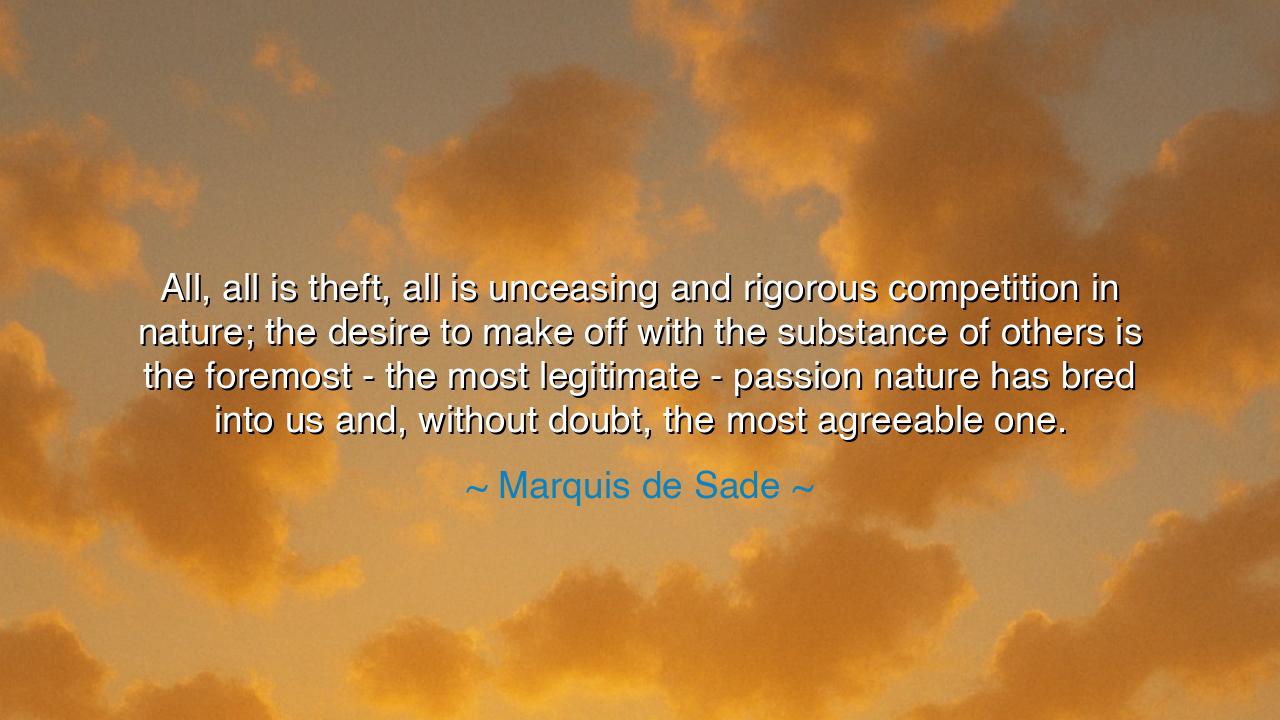
All, all is theft, all is unceasing and rigorous competition in
All, all is theft, all is unceasing and rigorous competition in nature; the desire to make off with the substance of others is the foremost - the most legitimate - passion nature has bred into us and, without doubt, the most agreeable one.






The Marquis de Sade, in his fierce and unsettling way, speaks to a truth that many prefer to leave veiled: that nature itself is theft. His words — “All, all is theft, all is unceasing and rigorous competition in nature…” — remind us that life is built upon a cycle of taking and consuming, where one being must survive by drawing from the essence of another. From the smallest seedling stealing sunlight from the soil’s shadows, to the lion seizing the lamb, the world is filled with this eternal contest. De Sade, in his brutal clarity, names this not an aberration, but a legitimate passion of existence.
When he declares that competition is unceasing, he is echoing a rhythm older than man. The ancients observed this in their fields and in their wars. The farmer’s grain was stolen by birds, the shepherd’s flock by wolves, and even the conqueror’s empire was always at risk of being taken by rival hands. This ceaseless struggle was not only tolerated by nature, but sanctified by her law. For it is through such tension that strength arises, that cunning sharpens, that life pushes ever forward.
Consider the story of Charles Darwin’s voyage on the Beagle, centuries after de Sade. In the Galápagos, Darwin observed the finches, each with their beaks adapted to steal nourishment in a different way: one cracking seeds, another piercing cactus, yet another prying at insects. Their survival depended not on peace, but on the ability to seize from their surroundings what another could not. Thus was born the idea of natural selection, the echo of de Sade’s dark assertion: that to live is to take.
And yet, de Sade goes further — he calls this passion not only necessary but agreeable. Here lies his challenge: is there joy in seizing, in triumphing, in prevailing over another? For man, the taste of conquest has always carried sweetness. The hunter rejoices in the kill, the merchant in the gain, the athlete in the victory. Even in love, there is pursuit, and in pursuit there is the thrill of possession. Though unsettling to gentle souls, this passion runs through us like blood in the vein.
But let us temper this truth with wisdom. Though competition may be nature’s law, unchecked it breeds only ruin. History gives us the example of Rome, which rose by taking — lands, riches, and peoples — yet collapsed when its hunger outgrew its strength. Theft without measure destroys both thief and victim. Therefore, the teaching is not to flee from competition, but to recognize its place, to master it with discipline and balance.
For the youth who hears these words, take heed: do not imagine life will hand you peace without struggle. The path is one of effort, of striving, of taking hold of opportunities before they are taken by others. But remember also: theft is not only of bread or of wealth — one may steal knowledge, steal wisdom, steal fire as Prometheus once did for mankind. Such thefts uplift not only the taker but all who share in their light.
The lesson is this: embrace the truth that life is struggle. Do not shrink from the contest, for it is the forge of your strength. But let your taking be guided not by blind hunger, but by vision, by restraint, by honor. Take what builds you, and give back what sustains others, so that the great wheel of existence turns not toward ruin but toward renewal. For in every age, from the beasts of the field to the empires of men, the law of nature is written: to live is to strive, and to strive is to seize. The wise one learns not only how to seize but how to share.






AAdministratorAdministrator
Welcome, honored guests. Please leave a comment, we will respond soon